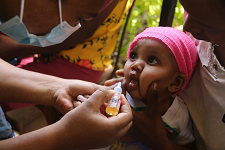Ethiopia on Friday launched the second-round polio campaign with type 2 novel oral polio vaccine (nOPV2) aiming to protect over 16 million under-five children from disability and death attributed to the ongoing polio outbreak in the country.
The four-day campaign will be conducted in all regions except Tigray, Addis Ababa and Afar, which the later implemented the first-round campaign in early April and will need to adhere to the four-week interval between the first and second doses to the vaccine, according to the statement from the World Health Organization Africa Office.
The launching was held in different regions in the presence of government officials, elders, religious and community leaders, parents and/or caregivers and partners.
The campaign is led and coordinated by the Ethiopian Public Health Institute (EPHI) and the emergency operation centers (EOCs) at all levels with support from partners.
The nOPV2 vaccine is a new tool approved through an Emergency Use Listing (EUL) procedure replacing the monovalent type 2 oral poliovirus (mOPV2) vaccine based on its superiority on proven protection against type 2 circulating vaccine-derived poliovirus (cVDPV2).
“This new vaccine has been introduced in the African Region to ensure, with other polio vaccines, that all forms of polio are eradicated so that children living in areas with low immunization coverage will be adequately protected against polio infection and subsequent paralysis,” said Dr Boureima Hama Sambo, WHO Representative in Ethiopia.
More than 100 technical staff and consultants have been deployed to support the campaign through:
• coordination,
• training of campaign teams,
• designing of and hands-on training for all campaign actors on the mobile-based preparedness and implementation monitoring tools such as google sheet and open data kit (ODK), and
• facilitation of the recruitment and deployment of independent monitors and surveyors for ensuring campaign quality.
World Health Organization (WHO) staff and consultants are also directly supervising and monitoring the campaign implementation in the communities. WHO has also deployed vehicles to facilitate transport of vaccines to vaccination sites.
Immunization partners, including WHO, UNICEF, the U.S. Centers for Disease Control and Prevention, the Bill and Melinda Gates Foundation, and implementing partners of USAID are on the ground to support this campaign, according WHO statement.

